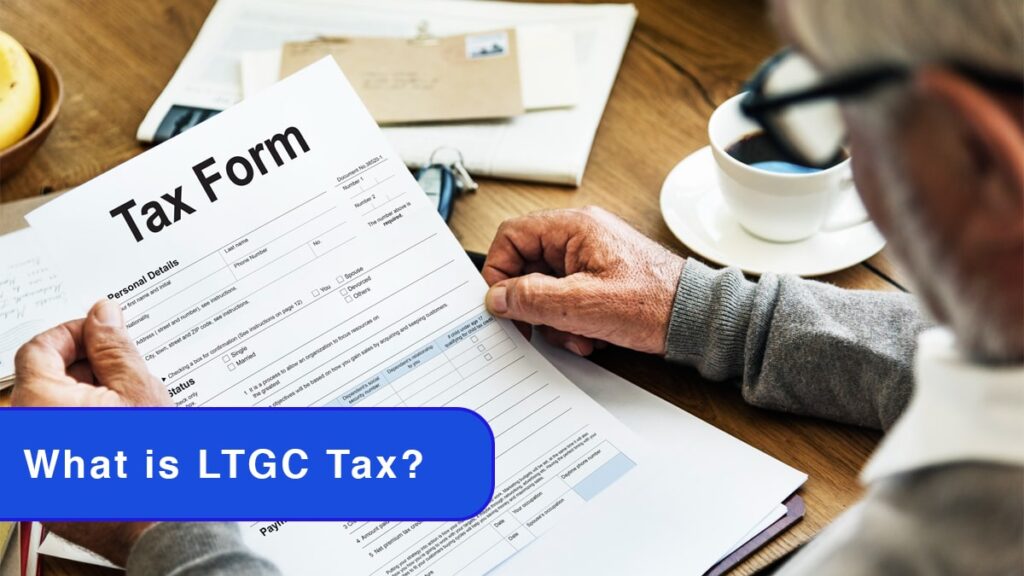Whenever an asset is sold, it presents an opportunity to generate income hence eligible for taxation. Whether it’s earning from investments or real estate, understanding the taxes associated with the sale becomes crucial.
Taxes can significantly impact your profits, so it’s essential to be well-informed. Calculating taxes involves considering various factors, but the pivotal element determining the entire tax calculation is whether the profit is from Long-Term Capital Gain (LTCG) or Short-Term Capital Gain (STCG).
In this article, we will delve into Long-Term Capital Gain (LTCG), the list of assets categorized under LTCG, taxes applicable to LTCG, and more.

What is Long-Term Capital Gain (LTCG)?
Long-Term Capital Gain (LTGC) refers to the profit earned from the sale of a capital asset that has been held for more than one year.
The primary objective behind distinguishing between short-term and long-term capital gains for taxation purposes is to incentivize long-term investments by imposing less taxation on long-term investments.
The tax on long-term capital gains is flat at 20% along with it the Governments commonly provide tax benefits for individuals who choose to hold onto their investments for an extended period, aiming to encourage stability in financial markets and promote a more sustained approach to investing.
List of Assets Considered as Long-Term Capital Gain (LTGC)
The following are the assets considered as Long-Term Capital Gain (LTGC)-
- Equity Shares: Profits from the sale of shares held for more than one year.
- Mutual Funds: Gains from the sale of mutual fund units held for an extended duration.
- Real Estate: Profit from the sale of property held for more than a specified period.
- Bonds & Debentures: Returns from the sale of bonds and debentures held for the long term.
- Gold & Precious Metals: Gains from the sale of gold and other precious metals, considering a prolonged holding period.
- Real Estate Investment Trusts (REITs): Returns from the sale of REIT units held for more than a year.
- Art and Collectibles: Profits from the sale of art, antiques, and collectibles held for an extended period.
- Government Securities: Gains from the sale of government-issued securities held as a long-term investment.
- Fixed Deposits: Interest income from fixed deposits, considered as LTCG after a specific tenure.
- Intellectual Property Rights: Proceeds from the sale of patents, copyrights, and trademarks held for more than one year.
Taxes on Long-Term Capital Gain (LTCG):
The taxes on the Long-Term Capital Gain (LTCG) are determined by specific rules determined by the Income Tax Act of 1961. Generally, LTCG is taxed at a lower rate compared to short-term capital gains. The following are the Long-Term Capital Gain (LTCG) taxes-
Formula to Calculate Long-Term Capital Gain (LTCG):
The basic formula to calculate Long-Term Capital Gain is as follows:
LTCG=(Selling Price of Asset−Indexed Cost of Acquisition)−Exemptions
Selling Price of Asset: The total amount received from the sale of the asset.
Indexed Cost of Acquisition: The cost of acquiring the asset is adjusted for inflation using the Cost Inflation Index (CII).
Exemptions: Certain exemptions may be available under tax laws, like the benefit of rollover in real estate or exemptions for certain investments.
Example-
Let’s consider an individual who purchased a piece of land in 2010 for Rs.50,00,000. He decided to sell this property in 2022 for Rs.75,00,000. The applicable Cost Inflation Index (CII) for the acquisition year (2010) is 167, and for the sale year (2022) is 317.
Now, let’s calculate the Long-Term Capital Gain using the formula:
LTCG= (Selling Price−Indexed Cost of Acquisition) −Exemptions
Selling Price of Property: ₹75,00,000
Cost of Acquisition: ₹50,00,000
CII of Acquisition Year (2010): 167
CII of Sale Year (2022): 317
Indexed Cost of Acquisition = ₹94,967.99
LTCG = (75,00,000−94,967.99) − Exemptions
LTCG = ₹74,05,032.01 − Exemptions
Exemption will be determined by the policies and your tax implications. For instance, if you pay the amount for purchasing a new house or land, then the taxes will be fully exempted.
FAQ
LTCG refers to the taxes on the profits from the sale of assets held for more than 12 months.
Any asset that has been held for more than 12 months will have to pay the LTGC Taxes.
Yes, LTCG has lower tax rates as an incentive for long-term investments as compared to STGC.
The CII adjusts the acquisition cost for inflation, providing a more accurate reflection of the investment’s real value.
Yes, certain exemptions or deductions may apply, depending on the nature of the investment made by you and within the given period.
Yes, tax regulations may vary for different assets; for instance, real estate may have specific rules.
The calculation involves deducting the indexed cost of acquisition from the selling price, considering applicable exemptions.
Yes, you can reinvest the amount into a few assets which can help you in avoiding taxes however, you’ll have to do it within the given time.



